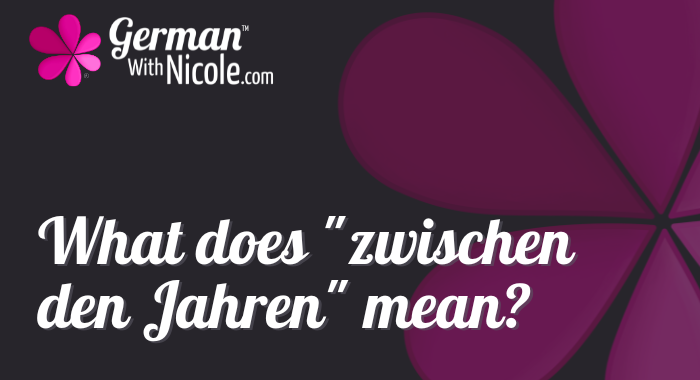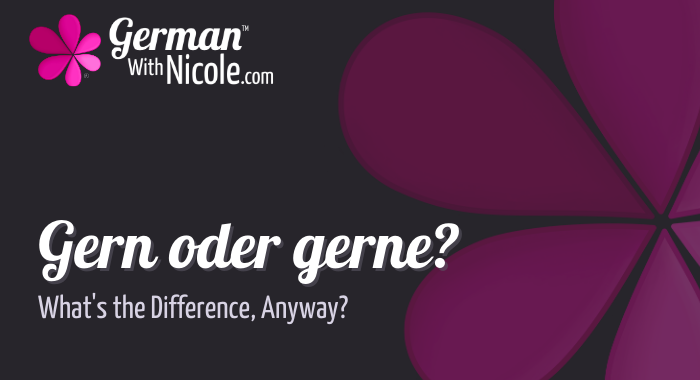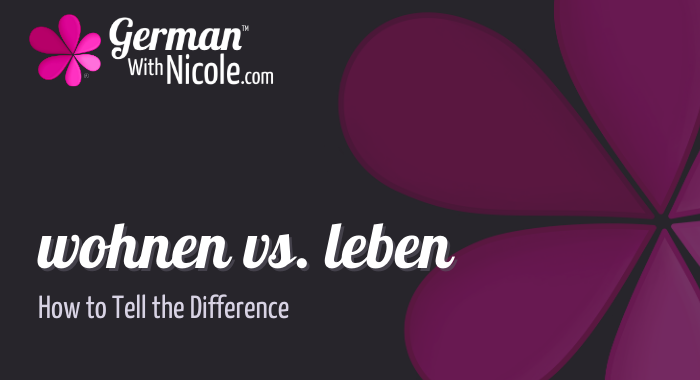Good ol'-fashioned RSS Feed
das Blog
Vokabeln
4 Reasons Minimalists Should Learn German (And Why German is Easier than English!)
If you are already living with less or a minimum amount of possessions, or would like to, this philosophy works in your favor when learning German. Experience a language which is significantly more predictable than English; German is a great language to explore!
You'll also discover here how, in many ways, German is actually easier than English. I say this as a native English speaker, a near-native German speaker, and an instructor for both languages.
Of course both languages have their own un…
What does "zwischen den Jahren" mean?
At the end of the year a lot of Germans use the phrase zwischen den Jahren. Between the years?! That's not possible!
Or is it?
There are two things you need to know about this phrase zwischen den Jahren.
1. It's a real thing.
A lot of German offices shut down on Heiligabend (Christmas Eve) and don't open again until after Neujahr (New Year's Day). That means all their everything must be done on December 23rd! Since they won't be back to work until the new year has begun, then they have finis…
5 Easy Books for A1 (Beginning) German Learners
Amended: This post now includes 8 Easy German Book recommendations for A1-level learners,
3 from adult literature and 5 from youth literature.
All of the books listed here are A1 books, however if you look in a bookstore, make sure you look for an emblem or a marking with "A1" on it. No matter where you buy it, I recommend you purchase a physical copy so you can take notes in the book and also so you can use the included audio/mp3 download with the book.
These are books I recommend for you fo…
How to Live Like a German
and make German a part of your everyday life.
Sometimes it amazes me how quickly people can pick up German words and sentence structure, even though they've never been to Germany and haven't learned German before.
Clients come to a lesson and they have no idea what German bread tastes like, but they can talk about German breakfast: das Brot, die Marmelade, der Kaffee.
It can be a source of frustration, however, to learn German, but only to have all these North American elements around us: sp…
Judaism & Hanukkah in German - Free Printable Flashcards!
As a little gift to you for Hanukkah this year, here are some printable flashcards on Judaism and Hannukah auf Deutsch!
What's fascinating about many vocabulary words for Judaism and Hanukkah in German is how strikingly similar they are to the English words. "Kosher" is simply spelled "Koscher," for example, and simply reflects the German spelling ("sch") as opposed to the English ("sh").
Here are the flashcards for general terms on "Das Judentum in Deutschland." (Judaism in Germany) This PDF …
Quick Guide to the «W-Fragen» in German and English
The W-Fragen in German are question words.
They are also known as 'open-ended questions. In English the W-Fragen also begin 'w': who, what, when, where, why, and how.
You begin learning the W-Fragen at the A1 level in German.
(These questions are different from the ja/nein Fragen or yes/no questions in German begin with the verb ("Arbeiten Sie heute?" "Kommen Sie aus Bayern?").)
In most books you usually see a list like this, it's just the German and English translations. But is that really…
Fünfzehn Synonyme für Geld
Für Geld gibt es im Deutschen gaaanz viele Wörter. Wie viele kennen Sie schon?
There are sooo many words for "Geld" (Money) in German. How many do you know already?
Nehmen Sie sich eine Minute und schreiben Sie so viele Wörter für Geld, die Sie kennen. Mit diesen drei können Sie anfangen:
Geld, Cash, Kohle ...
Also, hier gibt's einige, sowie eine kurze Erklärung zu den jeweiligen Vokabeln.
Here are a few synonyms, as well as a short explanation to each of these vocabulary words.
"Gern" oder "gerne"?
"Das mache ich gern."
"Ich gehe gern schwimmen."
oder
"Das mache ich gerne."
"Ich gehe gerne schwimmen."
Was ist eigentlich der Unterschied?! Sagt man eigentlich "gern" oder "gerne"? Gute Frage!
Man kann entweder "gern" oder "gerne" sagen--es macht praktisch keinen Unterschied. Je nach dem, was Sie sagen wollen, können Sie frei wählen, ob Sie "gern" oder "gerne" sagen möchten.
![]()
You can use either "gern" or "gerne" in German, it doesn't really make a difference. Depending on the sente…
wohnen vs. leben
IKEA Germany advertises with a catchy slogan:
Wohnst du noch, oder lebst du schon?
Are you still living, or are you already living?
Sehr lustig.
This works in German since wohnen ≠ leben. But the difference is significant. Here's how to tell the difference between wohnen and leben and which one to use when.
wohnen
"wohnen" is used for short-term situations.
"Ich wohne bei meinen Eltern" ...because I'm at home for the summer.
"Ich wohne bei einer Freundin" ...because I'm waiting for m…
kennen vs. wissen
"Kennen" is not the same as "wissen" and it can be very confusing trying to tell the two apart.
Here you will learn what "kennen" means, what "wissen" means, and finally how to tell the difference.
There are example sentences, too, and I highly recommend you grab your German notebook and write them down so you can refer back to them later.
kennen
Ich kenne... is for things you can get to know. You might not have always known your German friend Marius, however you got to know him once, which …
Categories
- A1 (70)
- A2 (55)
- B1 (47)
- B2 (24)
- C1 (22)
- Deutsch lernen (82)
- Einkaufen (15)
- Essen (12)
- Grammatik (24)
- Hören (14)
- Landeskunde und Kultur (50)
- Lesen (11)
- Musik (5)
- Nachrichten (4)
- Podcast (66)
- Pronunciation (3)
- Schreiben (4)
- Schwäbisch (4)
- Spiele und Spaß (Games and Fun) (12)
- Sprechen (12)
- Vokabeln (41)
- Video (13)
Would you like to hear about future German classes with Frau Warner?
With the E-Post, you'll receive information on German class registration and goings-on in German classes, all written by Frau Warner. You'll receive an email on Tuesdays, plus an extra email or two when class registration opens or there's something new.
If you use Gmail: please check your "promotions" folder.









